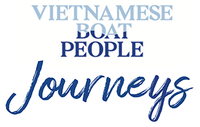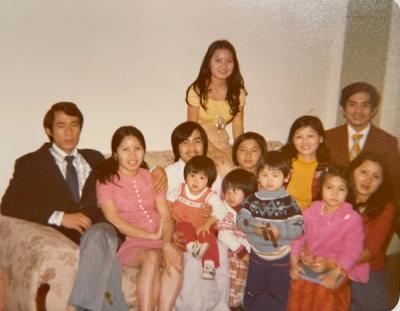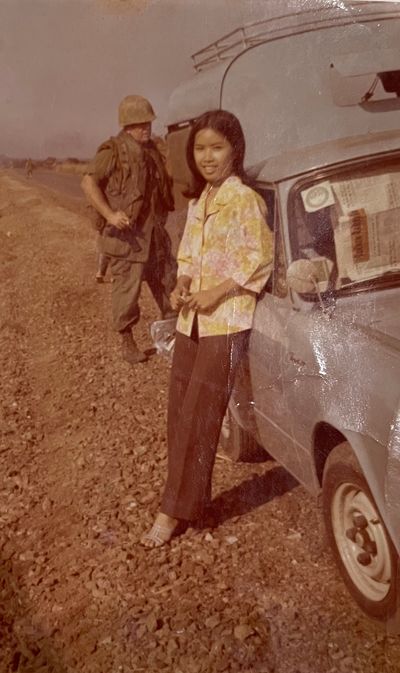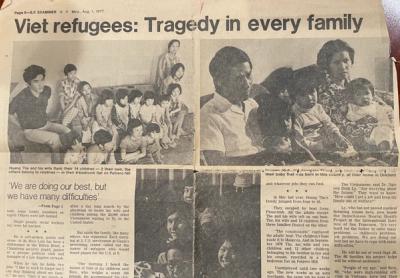The Story
From Vietnam to the Central Valley: Jessica Nguyen
Jessica Nguyen was born in Saigon, Vietnam and lived there for only a short while before escaping to America at sixteen months old. Although she was too young to remember the journey, her parents have helped fill in many of the blanks for her. Nguyen’s family’s life in Vietnam was characterized by uncertainty. Her mother said that there was always the fear of being bombed because it could happen at anytime. On top of that, her father was in the Air Force, so each day he left, there was no guarantee that he would return. Knowing that they could not live under the Communist rule, Nguyen’s family escaped in April of 1975 from a coastal town called Vũng Tàu.
This story was collected by Alexa Tran in 2022 as a part of her Girl Scout Gold Award Project.
Alexa [00:00:01] Hi, everyone. My name is Alexa, and I’m a high school student from the Central Valley of California. I’m currently pursuing my Girl Scout Gold Award, the highest honor a Girl Scout can earn, and for this project, I’m collecting and sharing the stories of Vietnamese boat people from all over the Central Valley. So today, I have Jessica Nguyen with me, and just to do a quick introduction can you talk a little bit about who you are and what you do?
Jessica Nguyen [00:00:24] Hi, my name is Jessica Nguyen. I am now a stay at home mom of four. I have three boys and one girl. I used to work in business, but I retired when I had my first child almost twenty years ago.
Alexa [00:00:43] All right. Thank you. So where were you born and where did you grow up or, yeah, where did you grow up in Vietnam?
Jessica Nguyen [00:00:51] I was born in Saigon, Vietnam, and I only stayed in Vietnam for sixteen months, and the whole time I stayed in Saigon.
Alexa [00:01:07] I guess you wouldn’t remember much about living there, but what are some things that your parents have told you about what life was like there?
Jessica Nguyen [00:01:17] Like you mentioned, I don’t have a lot of personal memories from Vietnam because I left when I was so young. I only know about Vietnam through stories I hear from my parents. I was born during the war, so there was a lot of ongoing conflict. My mom would say or tell me that you knew your house, your neighborhood can be bombed at any time. So, it was definitely scary times back then. My father was a pilot in the Air Force, so each day he left we never knew if he would return. So, there was a lot of uncertainty, even within our family. Maybe more for my parents and not so much for me since I was a baby, but the favorite aspects of living in Vietnam is just being in your native land where you speak the language, you share the culture and customs, and surrounded by others who share the same background. I would guess that the hardest part is growing up during the war time, we were poor. You live each day knowing that it can be your last, especially for males serving in the military. So those are just things about Vietnam that my parents have shared with me.
Alexa [00:02:34] So you were sixteen months old when you left. What year was this and from what city did you leave?
Jessica Nguyen [00:02:42] So my family left in April 1975. What was the second part of your question?
Alexa [00:02:50] Oh, what city did you leave from?
Jessica Nguyen [00:02:52] We went to Vũng Tàu, which is a coastal town. And I’m sure like many other boat people, that’s where we took smaller boats to go out into the ocean to meet up with larger ships.
Alexa [00:03:08] So what was your family’s hope for leaving?
Jessica Nguyen [00:03:13] I think because they my, my both of my parents are originally from North Vietnam, and they knew what living under communists was like. When the communists took over North Vietnam many years before that, their families had migrated down to Saigon. So, when the Communists was slowly moving down, taking over Central Vietnam and making their way to South Vietnam, they knew that they could not live under a communist rule. So their only option was to leave, especially since my dad fought against the Communists in the war. He knew that if he was caught or if he stayed behind, then, you know, he would be jailed and, you know, may lose his life.
Alexa [00:04:07] And who did you leave with and who was left behind?
Jessica Nguyen [00:04:12] My parents actually did not leave Vietnam together. Like I mentioned, my father was a helicopter pilot for the South Vietnamese Air Force. So at the time, my mother took me and my older brother, who was only 27 months old at the time, and she took us and five of her younger brothers and sisters to flee the country. My mom left my grandmother and her other brothers and sisters behind. My dad left his entire family behind.
Alexa [00:04:46] And, sorry one second. Oh, what was the most difficult part about leaving for your family?
Jessica Nguyen [00:04:56] I think the most difficult part was they left everything behind, came over to the U.S. with nothing except the clothes on our back, knowing that it was a very difficult journey. And like I mentioned, when we left, even my mother and father, we were separated at the time. So, but it was a matter of life and death, which is why, you know, at that moment, they just knew they had to go.
Alexa [00:05:29] So can you describe a little bit about what the journey was like?
Jessica Nguyen [00:05:34] Right. During this time, the US government ordered the military and commercial ships to park and wait at the border of international waters in order to rescue people escaping Vietnam. But not a lot of people knew that these ships were waiting out there. So if you knew and could get yourself out there, you would be rescued. So my dad had made arrangements for my mom to bring me and my older brother to Vũng Tàu, the coastal town where we boarded a small boat at night that brought us out to a bigger ship that was parked in the middle of the ocean. This ship was used to carry weapons but was now rescuing people fleeing Vietnam. We were one of the early groups, so the U.S. Military personnel would come down and bring each of us up onto the ship. But when more and more people came out, they had to be like pulled up onto the ship and some people even fell off and got lost at sea. My mother estimates thousands were able to squeeze onto this ship. We were crammed into a space that was small. Most adults had to stand. Some of these areas are where they used to store their guns and things like that. So they were trying to rescue as many people as they could get onto the ship. My dad was a helicopter pilot, so he, his journey out of the country was happening sort of when we were trying to get on the boat but he was separate. So, when we left, we never knew if we would ever be reunited with him. With his helicopter, he went and he picked up a few friends and brought them to Vũng Tàu where they would eventually take small boats out from there. And he tried to go back to Saigon to rescue my grandmother, but there were so many people standing on the rooftops that he couldn’t get his helicopter down low enough to pick more people up. So he ended up picking up just another friend from somewhere else, flying his helicopter directly to the USS Hancock, which is an American military ship where he landed. And eventually, because they wanted to use that space to bring as many people aboard, they ended up pushing his helicopter into the ocean because there was just no room for the helicopter. So my mom ended up seeing some of the men that he transferred to Vũng Tàu and started asking about my dad’s whereabouts. And they said that he had returned to Vietnam to try to rescue her family, more people. So we left still not seeing my, my dad. The ship we were on eventually took us to Guam, where the U.S. set up a refugee camp. And I believe it took either several days to around a week for us to get there. And when we got there, we actually heard my dad get on a speaker and make announcements trying to look for his family. So, yeah, so that’s how we got reunited with him.
Alexa [00:08:46] So after Guam, how long were you there? And where did you go after.
Jessica Nguyen [00:08:52] After Guam, they processed our paperwork, and we were eventually flown to Fort Chaffee in Arkansas. And at Fort Chaffee that’s where they did some more paperwork, waited for us to be able to match with sponsors. And I know that there were church organizations around the country who were sponsoring Vietnamese refugees. So from Arkansas, we were matched with a couple from Oakland, California. So that’s how we ended up in California.
Alexa [00:09:30] And what year did you go to Oakland?
Jessica Nguyen [00:09:35] We came to Oakland, I would say let’s say we left Vietnam April 1975. My guess would be within six months of that, because it took us several months from each of our little stops along the way.
Alexa [00:09:52] What was life like for your family trying to adjust in a new country as refugees or immigrants?
Jessica Nguyen [00:09:59] It was definitely hard because we didn’t have any money. We had nothing. We did not know the language. It was difficult for my parents. The family that sponsored us, they did not believe in government assistance. So we had no access to food stamps, welfare. I know some other boat people they had that type of assistance, but we did not. So it was all just try to find any type of job as soon as possible to try to make some money. The man who sponsored us, he had a real estate business, I would say. And he always needed people like handyman to work on small construction projects. So those were the early skills that my dad learned from him. So my dad was put to work right away. And my mom, she would do just anything that she could. She would be a housekeeper for the neighbors, mostly. And I think she did that for a while before she was able to find other types of jobs.
Alexa [00:11:12] And where did your family find strength in these difficult times?
Jessica Nguyen [00:11:18] I think my parents were just so busy trying to make a life, trying to survive, trying to work. I think that’s just that was their focus and that just kept them going, knowing that this was the best option. There was really no alternative. They could not stay in Vietnam, and they wanted to make the most of the opportunity they had.
Alexa [00:11:47] So how did you end up in the Central Valley?
Jessica Nguyen [00:11:50] So I grew up in the Bay Area. We were sponsored into Oakland, and I lived there all of my life. I ended up going to college in the Bay Area, UC Berkeley. And my husband was actually from the East Coast, but we met in the Bay Area and his job brought us to Fresno. This was back in 2003.
Alexa [00:12:15] And what do, what does it feel like as a Vietnamese-American here? Do you feel that you have a strong sense of community? Is there a big Vietnamese community here?
Jessica Nguyen [00:12:25] So I even though I came to the U.S. when I was sixteen months old, my parents, they really wanted to me to, I guess learn the language. So I went to Vietnamese school for eleven years. It was Vietnamese class at the church for eleven years, so I can still speak the language, read and write the language. When I when we moved down to Fresno, the Vietnamese community here was not as big. So, and I essentially grew up in America, so I feel like I’m pretty Americanized, but also still celebrate a lot of the Vietnamese traditions, like honoring our ancestors, celebrating New Year’s Tết. And these are traditions that we celebrate with our children as well. The red envelopes, you know, the some of the little gambling games that we play, getting together, eating a lot of Vietnamese food, those are all things that we try to share with our children so they still can identify with their cultural background.
Alexa [00:13:48] That’s all the questions I have for you. Is there anything else that you want to share about your story?
Jessica Nguyen [00:13:53] No, I think that’s pretty much it. Thank you for your time.
Alexa [00:13:56] Okay. Thank you so much for your time.



